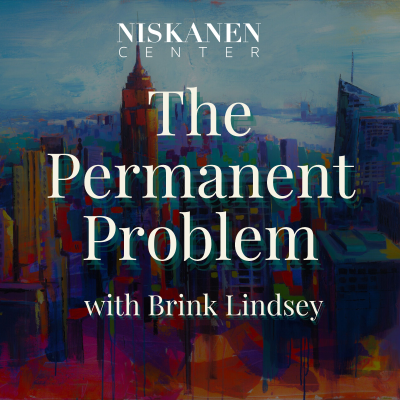
The Permanent Problem
Podcast by Brink Lindsey
This podcast is free to listen on all podcast players and the Podimo App without a subscription.
All episodes
6 episodesA new movement is taking shape around the idea of restoring "abundance." Uniting thinkers from across the political spectrum -- including "supply-side progressives," "conservative futurists," and "state capacity libertarians" -- the movement aims to jump-start technological and economic progress by removing artificial constraints on supply and improving the quality of government. On this episode of The Permanent Problem podcast, Brink Lindsey interviews a leading analyst and advocate of abundance: Eli Dourado, chief economist at the new Abundance Institute and an expert on policy barriers to the emergence of new technologies. Discussing the "great stagnation" in productivity growth, Lindsey and Dourado focus on how most of productivity growth occurs outside the R&D lab, and how therefore broad institutional and cultural factors weigh heavily in determining an economy's overall vitality. Sharing an interest in the work of anthropologist Joseph Tainter, a leading theorist of civilizational collapse, the two also discuss our modern technological civilization's vulnerability to decline and cataclysm -- and how an abundance agenda can reduce that vulnerability.
Birth rates are plummeting around the globe, as half the world's population now lives in countries with sub-replacement fertility rates. Total population is already falling in Japan, Italy, and China, and global population decline looks likely to begin within a few decades. Yet as American Enterprise Institute senior fellow Tim Carney points out in his new book Family Unfriendly, the United States bucked these worldwide trends until relatively recently. As of 2007, the U.S. was above replacement fertility and even trending upwards, but since then births have fallen off sharply. On this episode of the Permanent Problem podcast, Tim Carney joins host Brink Lindsey to discuss why low fertility and population decline are problems worth worrying about, examine the social and cultural trends that are pushing us away from parenthood and family, and take a look at the exceptional places that continue to embrace big families for clues as to how things might turn around.
Over the past half-century, societies around the world have made great strides in elevating the status of women and expanding their educational and employment opportunities. Much work remains to be done, but now an unexpected complication confronts us on the path toward greater gender equality: at the same time that girls and women have been advancing and making progress, men and boys -- especially those outside the socioeconomic elite -- have started to fall behind. In the U.S., the gender gap in college degrees is wider today than in 1972 when Title IX was passed to promote gender equality on campus -- except now the gap favors women. Men without college degrees have seen slower-rising incomes than any other group, and more and more are dropping out of the work force altogether. Meanwhile, family formation and childbearing are down, in part due to the dwindling supply of "marriageable" men. On this episode of The Permanent Problem podcast, Richard Reeves, author of the widely discussed new book Of Boys and Men, joins Brink Lindsey to discuss the contemporary struggles of boys and men and place them in wider context. As Reeves notes, social progress always creates new and unanticipated problems, and facing them constructively is the great ongoing challenge and privilege of life in a free society.
What determines our visions of the future, and how those visions change over time? How is politics shaped by conflicting visions of the future? What did the old mid-century vision of a Jetsons-style future get wrong -- and what did it get right that we are now struggling to rediscover? What are the roots of technological pessimism, and how can we encourage the growth of a culture that valorizes scientific and technological advance? On this episode of The Permanent Problem podcast, author Virginia Postrel (The Future and Its Enemies, The Fabric of Civilization, and more) joins the Niskanen Center's Brink Lindsey to discuss the ongoing and ever-changing struggle between the forces and champions of dynamism and progress and those that favor the status quo or an imagined past.
"We wanted flying cars, instead we got 140 characters." Peter Thiel's famous complaint hearkens back to the middle of the 20th century, when high economic growth seemed unstoppable and the future was filled with visions of moon bases, nuclear energy too cheap to meter, and yes flying cars. But in the 1970s, economic growth slowed down and the future suddenly darkened, now menaced by threats of overpopulation and runaway pollution. Except for a few brief years during the internet boom of the 1990s, the old dynamism and optimism have never returned. In his new book The Conservative Futurist, American Enterprise Institute scholar James Pethokoukis investigates what he calls the "Great Downshift" of the past half-century - and surveys the hopeful evidence that a new burst of technological and economic innovation may be in the offing. Pethokoukis joins Brink Lindsey to discuss the book, review what's gone wrong in both public policy and the broader culture, and explore (in the words of the book's subtitle) "how to create the sci-fi world we were promised."
Available everywhere
Listen to Podimo on your phone, tablet, computer or car!
A universe of audio entertainment
Thousands of audiobooks and exclusive podcasts
No ads
Don't waste time listening to ad breaks when listening to Podimo's content.



















